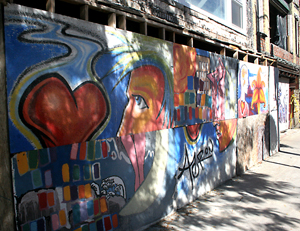
One dollar is all it will take for some Broome County flood victims to buy a new home after a new housing plan was recently approved by Binghamton Mayor Matt Ryan.
As part of the Restore New York program, various dilapidated properties around the City of Binghamton will be removed or renovated as part of a blight-removal initiative.
More than 20 of the lots will be sold to Binghamton applicants for $1 a piece. Priority for recipients of these homes will be given to families who have lost their original homes as a result of the summer of 2006 flood.
The plan is working in conjunction with the Binghamton Neighborhood Assemblies Project, part of a civic engagement program that aims to establish stronger relationships between citizens and their communities on the whole.
As part of the plan, each of Binghamton’s eight major neighborhoods will be represented by its own grassroots democratic forum. Citizens are encouraged to use their respective assemblies as outlets to voice their needs and concerns about the community. The assembly members then work with the local government to find attainable solutions.
These neighborhood assemblies were first held in February 2006 and were modeled after a successful endeavor in Burlington, Vt., which had been in effect for more than 20 years.
According to Tarik Abdelazim, executive assistant to the mayor, the neighborhood assemblies were an immediate success, with more than 1,000 residents participating within the first eight weeks. Since then, thousands of Binghamton citizens have been involved in activities from assembly meetings to community restoration projects.
The Binghamton Graffiti Abatement Team is one such solution formed by the assemblies. Volunteers have begun re-painting public properties that have been vandalized by illegal graffiti in hopes of restoring pride in the area. The assemblies also sponsor the ‘Paint the Wall Fund,’ an effort dedicated to providing a section of public wall for legitimate graffiti artists to showcase their work legally.
The assemblies project has just been awarded $70,000 for its neighborhood development fund. The city will begin accepting proposals for allocation of the funds later this month.
The money is expected to be used for projects like cleaning up public areas and installing new benches this upcoming spring.
But the only projects that will be put into action are those that are officially proposed by residents, so Abdelazim encourages participants to come up with creative solutions.
‘The first year was an incredible success and the second year shows continued promise,’ he said.


